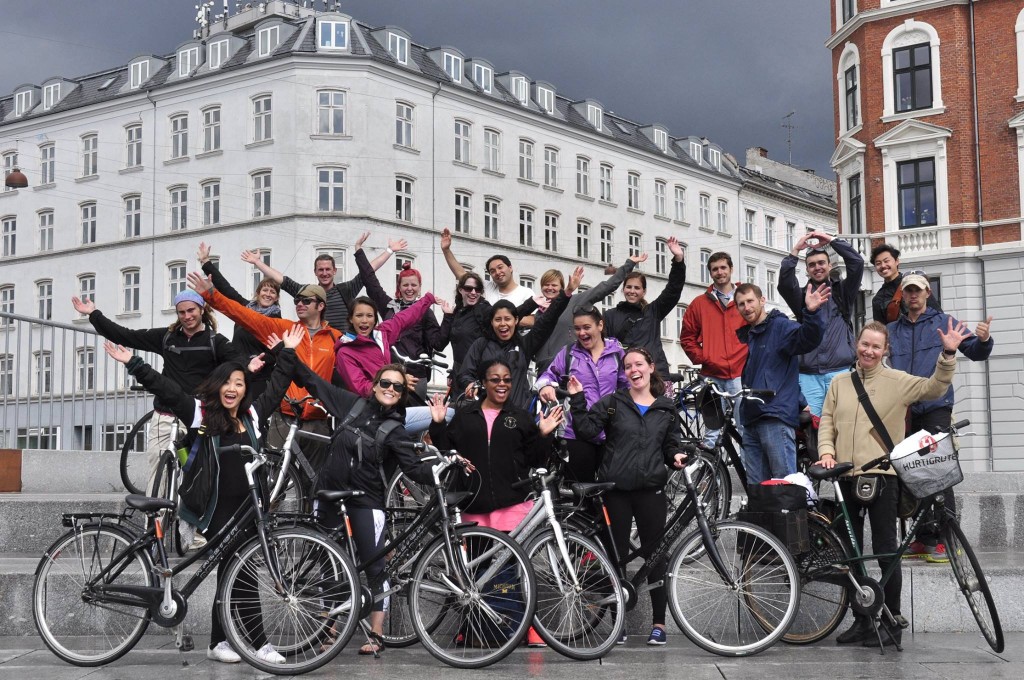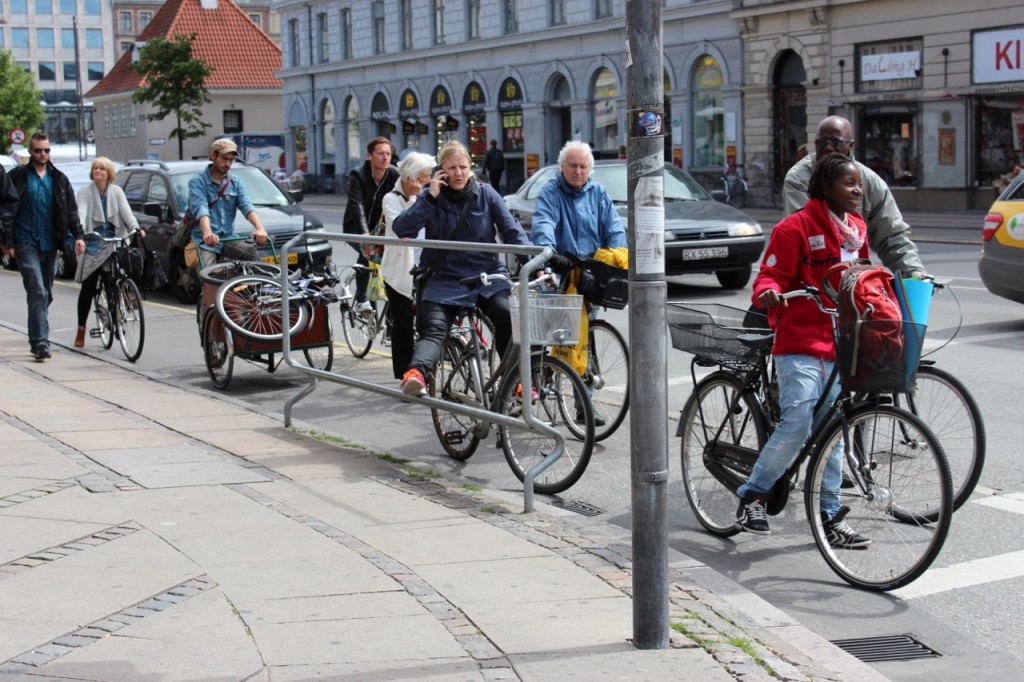The Summer 2023 Class WAS COMPLETELY FULL
June 22 – July 20, 2023
Base Locations: Copenhagen, Odense, Amsterdam, Nijmegen, & Utrecht

Click HERE for the official program web page and application link.
The NEXT class will be offered again in summer 2025; the following information was shared in anticipation of the 2023 class and provides a good reference, for now, for 2025. Interested in experiencing what it is like to be on a bike, in a city, and feel completely normal? Interested in how that can be done through design, policy, and social change? Then come join the 2022 Bicycle Transportation Study Abroad course. Space is limited to 15-19 students, anyone enrolled at a U.S. university can enroll, partial scholarships are available for every student (must be US citizen), and the sooner you apply, the better your chance in getting in to the class. For our last two offerings, the class was filled by Thanksgiving so keep that in mind for 2024.
A few high level things for 2023:
- Dates: June 22 – July 20, 2023
- We will stay in Copenhagen (Denmark), Odense (Denmark), Amsterdam (Netherlands), Nijmegen (Netherlands) and Utrecht (Netherlands). A day trip to Malmö, Sweden may be included.
- You do not need to be an avid cyclist or even know much about how cities are designed for people on bikes. You just need to be very interested in experiencing and learning about it and putting your knowledge into action afterward. We do bike in cities every day, though, so you need to be able to ride a bike.
- Students from multiple universities, multiple disciplines, and both undergraduate and graduate students are welcome. We create a great community and this diversity is a strength.
- I will be leading the 2023 class after Professor Rebecca Lewis (University of Oregon, City Planning) led a great class in 2022. This will be the seventh iteration of this class, so we have a good network of amazing people in each country who will teach us, share with us, and be unbelievable resources for course content and cultural inquiries.
- We challenge each class to come up with a way to take their collective learning and share it with people back home. Here is an amazing compilation of insights and reflections by the 2015 group.
- The final program cost varies from year to year and the final number will be available on the official UO GEO page. In 2022, it was around $8,270, not including scholarships, and the 2023 class aims to be about the same. In 2023 every student who wishes will receive a faculty-based scholarship (in the range of $1,200-1,500) due to the generous support from the Scan Design Foundation (note: this scholarship is only available to U.S. citizens). Additional competitive scholarships (need and merit based) are available through the University of Oregon GEO office and are available to both U.S. and international students. Students from other universities may have scholarship programs to apply to as well.
- Included in the cost are the academic credits (8), daily bike rental, lodging, breakfasts typically, a couple group meals, in-program travel (train for longer site visits and train/plane to get from country to country), and a few cultural excursions. Not included is your airfare to/from Europe (you book that on your own), most lunches and dinners, and extra stuff you want to buy along the way. Many meals end up being shared events where students pick up various things from a market and have a collective meal in a park. The places we stay typically offer breakfasts that include a variety of food items, including things like rolls / cheeses / meats that many might think of as lunch food, so some students pack a lunch from their included breakfasts to save a little money. Different students inevitably have different budgets, and there are inexpensive ways to eat well and enjoy the incredible places where we will be. A full anticipated set of likely expenses is available at the GEO program page or here.
- Of course, COVID has impacted the way we all live and travel and no one knows what the summer of 2023 will look like for international travel and study abroad. We are planning as though the class will happen, and letting us know sooner rather than later that you are interested is really important.
- To apply, go here .
Anticipated 2023 Schedule (allow for some small changes as we continue to flesh things out):
| Date | Location |
| Thursday, June 22, 2023 | Copenhagen |
| Friday, June 23, 2023 | Copenhagen |
| Saturday, June 24, 2023 | Copenhagen |
| Sunday, June 25, 2023 | Copenhagen |
| Monday, June 26, 2023 | Copenhagen |
| Tuesday, June 27, 2023 | Copenhagen |
| Wednesday, June 28, 2023 | Copenhagen |
| Thursday, June 29, 2023 | Copenhagen |
| Friday, June 30, 2023 | Odense |
| Saturday, July 1, 2023 | Odense |
| Sunday, July 2, 2023 | Odense |
| Monday, July 3, 2023 | Amsterdam |
| Tuesday, July 4, 2023 | Amsterdam |
| Wednesday, July 5, 2023 | Amsterdam |
| Thursday, July 6, 2023 | Amsterdam |
| Friday, July 7, 2023 | Amsterdam |
| Saturday, July 8, 2023 | Amsterdam |
| Sunday, July 9, 2023 | Amsterdam |
| Monday, July 10, 2023 | Njimegen |
| Tuesday, July 11, 2023 | Njimegen |
| Wednesday, July 12, 2023 | Utrecht |
| Thursday, July 13, 2023 | Utrecht |
| Friday, July 14, 2023 | Utrecht |
| Saturday, July 15, 2023 | Utrecht |
| Sunday, July 16, 2023 | Utrecht |
| Monday, July 17, 2023 | Utrecht |
| Tuesday, July 18, 2023 | Utrecht |
| Wednesday, July 19, 2023 | Utrecht |
| Thursday, July 20, 2023 | Depart |
More Detail From Previous Syllabus:
The program is an eight-credit, three-week traveling seminar in The Netherlands and Denmark to study bicycle planning, design, policy and culture as a sustainable and economically viable form of transportation. The course will focus on the practices and policies that foster safe, convenient and accessible bicycle infrastructure and the underlying culture that supports a high rate of bicycle use. As part of the program, students will observe and experience a variety of cycling facilities in urban, suburban and rural locations, meet with local officials and government representatives for formal presentations and informal dialogue about their bicycle transportation planning and design; and engage in conversation with program faculty to reflect on the day’s activities. Students will keep a reflection journal and a field notebook to record observations and lecture notes (via blog or other means per student preference, although a blog is highly encouraged), will take photographs to document their observations, and will dissect specific bicycling environments to understand the pieces that make it work (or not). Before the study tour, students will conduct an observation paper of a U.S. intersection or transportation facility and write a brief paper.
Course Objectives
The purpose of this course is to give students the opportunity to explore the various elements involved in planning for increased utilization of bicycles as a form of urban transportation. This is not a design or engineering class, but one that looks at design and engineering, as well as culture, policy, education, history, and other elements that help create vibrant communities where bicycles are a primary mode of transportation for a large swath of the population. The class will consist of a combination of teaching and learning approaches, including the use of lectures, guest lectures by practitioners, in-class exercises, and out-of-class hands-on assignments.
Course objectives include:
- Understand the role of bicycling in urban transportation;
- Understand the role of policy and planning in shaping urban form and transportation choices;
- Understand the contribution of design, safety, and legal issues toward bicycle planning;
- Learn the critical components of successful integration and promotion of walking and bicycling into communities.
Schedule
Each day will be a little different and some last minute changes should be expected. Many days will include a few hours of lecture and a bike ride to see something firsthand. There will be many discussions and short rides to become familiar with the bicycle facilities and riding culture. Many days will include meeting with local officials to develop an understanding of the policies and planning practices in each location. When possible, some local rides will be done with local officials. A range of cities and urban form within those cities will be visited in order to understand cities of different sizes, ages and characteristics.
Lunch will generally take place as a group, with evenings unscheduled to provide time for students to review and annotate their field notes, to write reflections of the day’s activities and learning experiences, and to further explore the local environment.
There will be a couple group meals and some pre-organized tours of local cultural highlights. Most meals will be on your own, although it is encouraged to cook and eat and explore together.
Final Note
Students typically remain connected far after the course, which is a reflection of the fun and insight and connections made among cohorts during the class. Thus, this is both a learning opportunity and a moment to develop a future professional network. Each group of students is different, but it is very important to me that we create a supportive group committed to making the world a better place. Groups typically have mixes of introverts and extroverts, “bike people” and “non-bike people”, students traveling abroad for the first time and some seasoned travelers, those that fear getting lost and others who love the opportunity that comes with being lost – all are welcome and I work very hard to ensure we will be a group that makes this inspiring, impactful, important, and fun!
For the introverts specifically – the schedule may look like you need to be “on” a lot of the time, but rest assured that there will be ample opportunities to find ways to re-charge separate from the group. That said, the general feedback from past years from our introverts has been one of amazement of how enjoyable and a complete surprise it was to be with everyone so much of the time. We all need ways to recharge and I also try very hard to create an extremely cohesive and supportive community.
